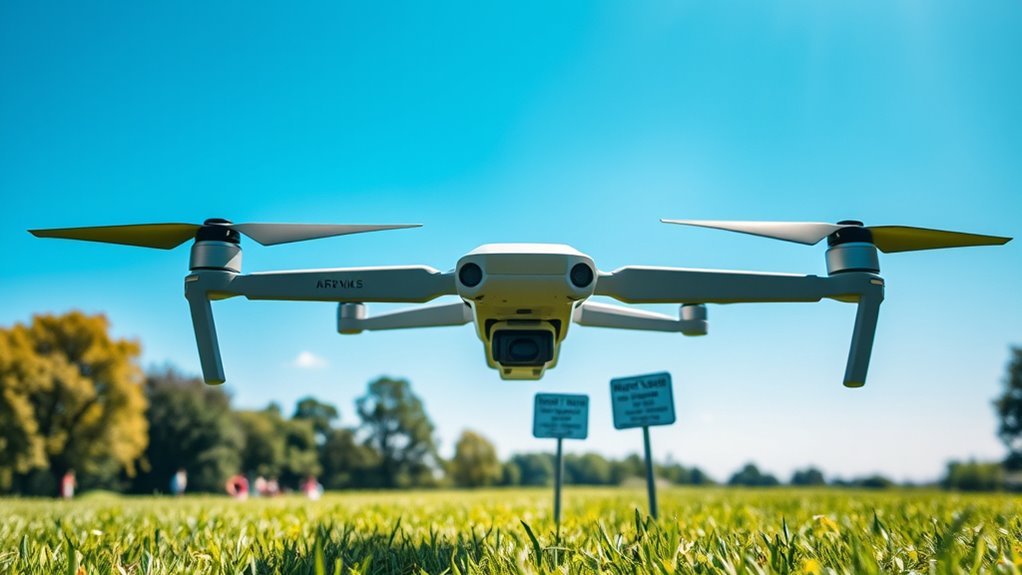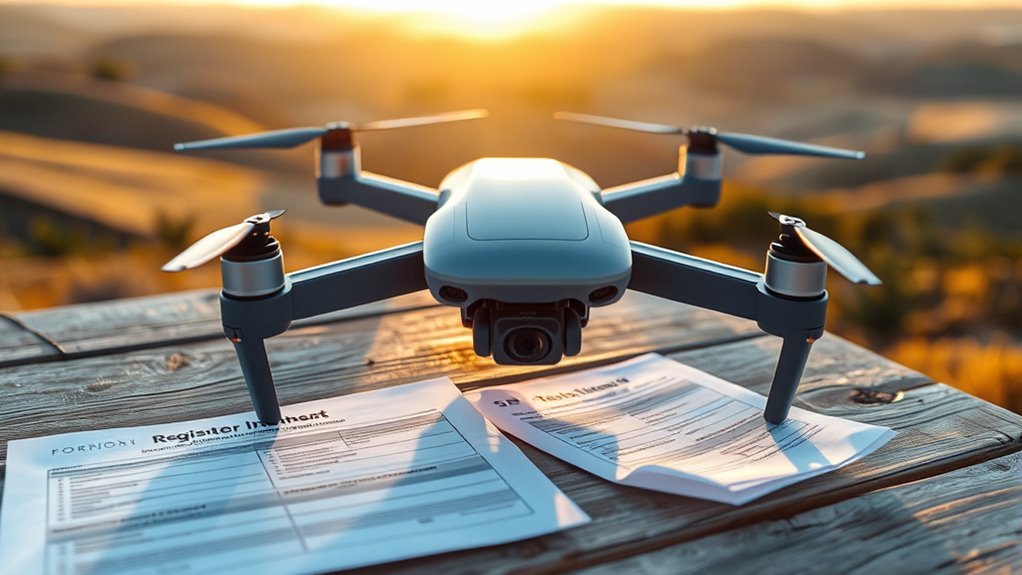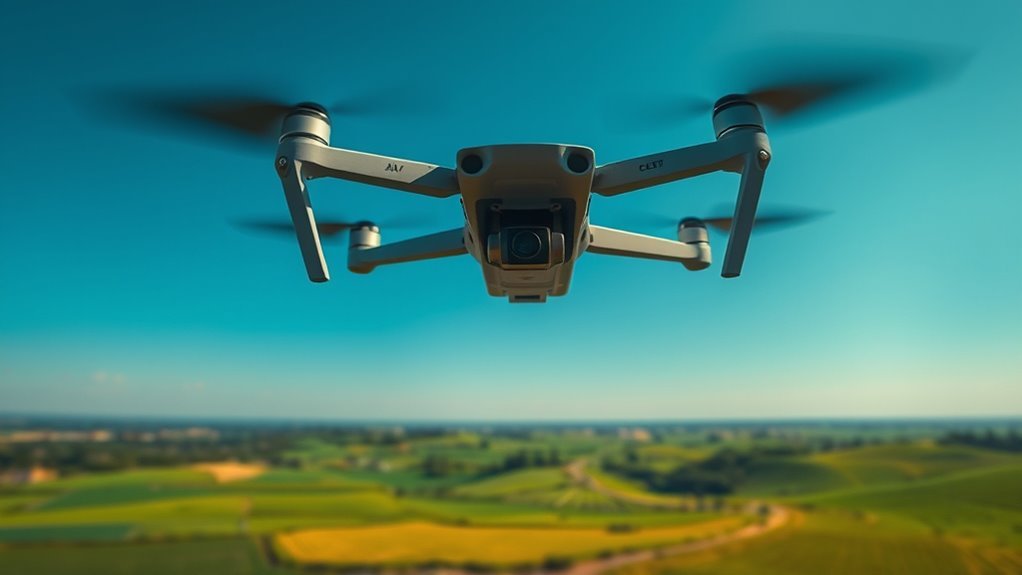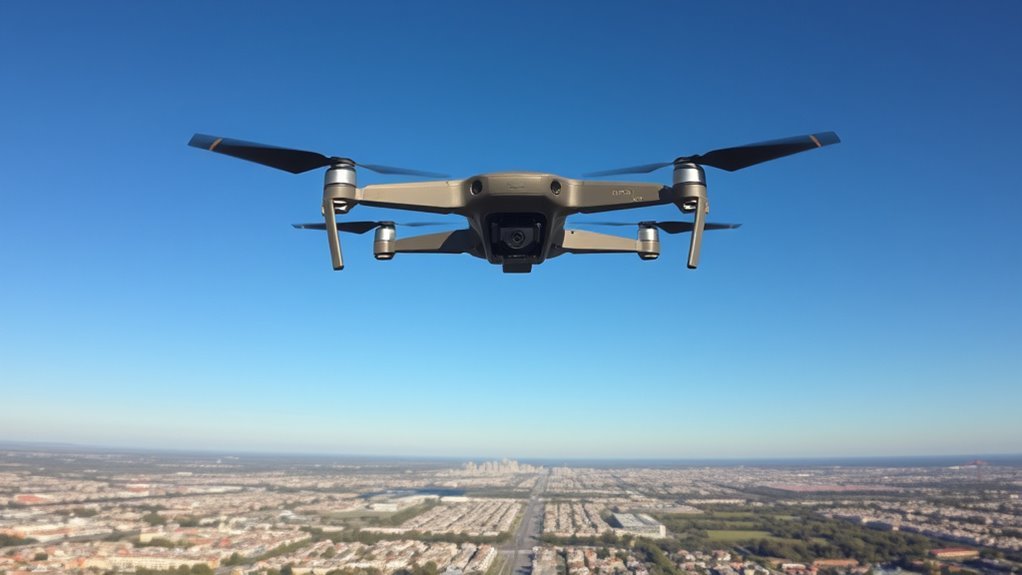If your drone weighs over 0.55 pounds (250 grams), it typically needs to be registered to comply with aviation regulations. Registration is essential for airspace management and safety, as it helps avoid fines and legal issues. Each country has its own rules, and some states impose additional requirements. To guarantee you’re following the right guidelines, it’s wise to understand your local regulations in detail and explore the associated responsibilities further.
Understanding Drone Registration Requirements

When considering whether your drone needs to be registered, you might wonder what specific criteria determine this requirement. Generally, if your drone weighs over 0.55 pounds (250 grams), you’ll likely need to register it to comply with regulations. This requirement aims to enhance drone safety, ensuring responsible operation within designated flight zones. Additionally, you should consider the drone’s intended use—commercial flights often necessitate registration, while recreational use may not, depending on local laws. Understanding these parameters not only helps you stay compliant but also promotes safe flying practices. Ultimately, knowing when and why to register your drone empowers you, allowing you to navigate the skies freely while respecting regulations designed for everyone’s safety. Furthermore, certain drones, such as racing drones participating in organized events, have distinct registration requirements that must be adhered to for compliance. It is also essential to remember that registration with the GCAA is mandatory for drones over 250 grams to ensure proper airspace management and safety.
The Importance of Registering Your Drone

While you might be tempted to overlook the registration process for your drone, doing so can have significant implications for your flying experience. Registering your drone not only complies with legal requirements but also enhances drone safety for you and others. By registering, you gain access to important resources and information that can improve your flying skills and awareness of airspace regulations. Additionally, registration benefits include protection against fines and potential legal issues, ensuring you can fly freely without fear of repercussions. This peace of mind allows you to focus on enjoying the open skies rather than worrying about compliance. Ultimately, registering your drone fosters a responsible flying culture that contributes to a safer and more enjoyable drone community. Furthermore, it is crucial to stay informed about local regulations to ensure compliance while flying.
Registration Regulations by Country

How do registration regulations for drones vary around the world? Across different countries, you’ll find a patchwork of international regulations governing drone classifications. For instance, in the United States, drones weighing over 0.55 pounds must be registered, while in the UK, all drones over 250 grams require registration. In contrast, some countries may have minimal or no registration requirements, emphasizing personal freedom in drone usage. However, you’ll often encounter classification systems that categorize drones based on weight, usage, or capability, impacting registration obligations. It’s vital for you to understand these diverse regulations to guarantee compliance and protect your right to fly freely, while also considering the broader implications of drone activity on privacy and safety.
Specific State Regulations in the United States
When operating your drone in the United States, you need to be aware that specific state regulations can vary considerably. Some states have their own registration requirements, while others impose local flight restrictions that could impact where and how you can fly. Understanding these nuances is essential to guarantee compliance and avoid potential penalties.
State Registration Requirements
Which state you’re flying in can greatly impact whether your drone needs to be registered. Each state has its own specific guidelines that determine registration requirements. For instance, some states require registration for drones weighing above a certain threshold, while others may not have any registration enforcement at all. Understanding these rules is essential for maintaining your freedom to operate without legal complications. It’s important to stay informed about local laws, as they can affect your flying experience considerably. Always check your state’s regulations before taking to the skies, as non-compliance can lead to penalties. Being aware of these state-specific requirements helps guarantee that you enjoy your drone flying adventures responsibly and legally.
Local Flight Restrictions
While understanding state registration requirements is essential, it’s equally important to recognize that local flight restrictions can dramatically influence where and how you can operate your drone. Local airspace regulations often vary, and being aware of them can prevent costly mistakes.
- Check for designated drone no fly zones in your area.
- Be mindful of temporary flight restrictions, especially during events.
- Investigate any local laws regarding drone usage in parks or residential areas.
- Stay updated on changes in local regulations to maintain compliance.
Neglecting these local flight restrictions can limit your freedom and may result in penalties. By understanding the specific rules in your area, you can confidently navigate your drone operations without running into legal troubles.
How to Register Your Drone
To register your drone, you’ll first need to understand the specific steps involved in the registration process. This includes gathering required information such as your personal details and drone specifications, as well as being prepared to pay any applicable fees. Ensuring you have everything in order will streamline your registration experience and help you comply with legal requirements.
Registration Process Overview
How do you navigate the drone registration process? Understanding the steps can help you stay compliant while enjoying the freedom of flying your drone. Here are some best practices to keep in mind:
- Determine if your drone requires registration based on weight.
- Use the FAA’s online portal for a streamlined registration experience.
- Keep records of your registration for future reference.
- Be aware of registration timelines to avoid penalties.
Required Information and Fees
When registering your drone, you’ll need to provide specific information and pay a small fee. The registration process typically requires details like your name, address, email, and the drone’s make, model, and serial number. This data guarantees proper identification and helps maintain accountability in the skies. You’ll also pay a registration fee, which is relatively low, making compliance accessible.
The registration benefits are significant; it not only legitimizes your drone usage but also enhances safety and awareness. By registering, you demonstrate responsibility, reducing the risk of legal issues and potential fines. Embracing this process fosters a culture of freedom in drone flying while guaranteeing that you’re adhering to regulations designed to protect everyone.
Fees Associated With Drone Registration
Although many drone enthusiasts may underestimate the costs involved, the fees associated with drone registration are an essential factor for any operator. Understanding these registration costs helps you make informed decisions and enjoy your flying experience without unexpected financial burdens. Here are a few key points to take into account:
- Standard U.S. registration fee is typically $5 for three years.
- International fees may vary greatly depending on the country.
- Additional costs may arise from necessary inspections or modifications.
- Renewals or updates can incur extra charges, depending on changes in regulations.
Consequences of Flying an Unregistered Drone
Flying an unregistered drone can lead to significant legal penalties, including fines and potential criminal charges. Additionally, without registration, you may face issues with insurance coverage, leaving you financially vulnerable if an incident occurs. Understanding these consequences is essential for responsible drone operation.
Legal Penalties Incurred
Failing to register your drone can lead to significant legal penalties, which shouldn’t be underestimated. The potential legal repercussions can be severe, affecting your freedom to fly.
- Fines incurred can reach up to $250,000 for serious violations.
- Criminal charges may be brought against you for repeated offenses.
- Your drone may be confiscated by authorities.
- You could face restrictions on future drone operations.
These penalties underscore the importance of compliance with registration requirements. Ignoring them can result in not only financial burdens but also a loss of autonomy in your hobby or profession. By ensuring your drone is registered, you protect yourself from these unwanted consequences and maintain the freedom to explore the skies responsibly.
Insurance Coverage Issues
Neglecting to register your drone can also complicate your insurance coverage considerably. Most insurance policies require compliance with local regulations, including drone registration. If you’re flying an unregistered drone, your liability coverage might be voided, leaving you exposed in case of accidents or damages. Insurers may view unregistered drones as a higher risk, leading to increased premiums or outright denial of coverage. In the event of a claim, you could face disputes that delay or prevent compensation. To maintain your freedom while flying, guarantee your drone is registered to safeguard against potential financial repercussions. Ultimately, protecting your investment and liability hinges on understanding and adhering to these requirements. Don’t let registration issues jeopardize your flying experience.
Exemptions and Exceptions to Registration Rules
What specific circumstances might exempt you from registering your drone? Understanding the exemption criteria can help you navigate this complex landscape. Here are some scenarios where registration may not be necessary:
- Weight Limit: Drones under 0.55 pounds (250 grams) typically don’t require registration.
- Drone Categories: Certain toy drones are classified in a way that bypasses registration.
- Educational Use: If you’re using a drone solely for educational purposes, exemptions may apply.
- Government Operations: Drones operated by government entities often fall outside registration mandates.
Tips for Staying Compliant With Drone Laws
Staying compliant with drone laws is essential for safe operation and avoiding legal penalties. To guarantee drone safety, familiarize yourself with the regulations specific to your region, as they can vary greatly. Always maintain a visual line of sight with your drone and avoid flying over people or restricted areas. Keep your drone under the maximum altitude limit, typically 400 feet, to minimize risks. Register your drone if required, and make sure it displays the registration number prominently. Regularly check for updates on local laws and FAA guidelines, as regulations can change. Additionally, understand that federal laws regulate drone use to ensure safety within national airspace. Finally, consider joining a drone community where you can exchange compliance tips and experiences, helping you stay informed and maintain your flying freedom responsibly. Additionally, be aware of the legal consequences of shooting down a drone, as this action could lead to serious penalties and liability.
Resources for Drone Owners and Pilots
As a drone owner or pilot, having access to reliable resources can greatly enhance your flying experience and guarantee compliance with regulations. Utilizing the right tools can help you maintain your drone and secure flight safety. Here are some essential resources you should consider:
- Online forums and communities: Connect with fellow pilots for tips and shared experiences.
- Regulatory websites: Stay updated on local laws and registration requirements.
- Drone maintenance guides: Follow detailed instructions to keep your equipment in top shape.
- Flight safety apps: Use technology to monitor weather conditions and no-fly zones.
Additionally, understanding signal attenuation is crucial for optimizing your drone’s performance and ensuring safe operations.
These resources empower you to enjoy the freedom of flying while securing that your drone remains compliant and safe in the skies.
Frequently Asked Questions
Can I Fly My Drone Without a Pilot’s License?
You can fly your drone without a pilot’s license, but you must adhere to drone regulations. Pilot certification isn’t always required for recreational use, yet understanding the rules guarantees you fly safely and legally.
What Happens if I Lose My Drone Registration Certificate?
If you lose your drone registration certificate, it can complicate things. You’ll need to navigate the drone registration process again, potentially facing legal implications. Don’t worry; it’s a straightforward process to replace that lost certificate.
Are There Restrictions on Where I Can Fly My Drone?
Yes, there’re restrictions on where you can fly your drone. You must avoid no fly zones, such as near airports or military bases, and adhere to specified flying altitudes to guarantee safety and compliance.
How Often Do I Need to Renew My Drone Registration?
Like a phoenix rising, your drone’s registration needs renewal every three years. This registration duration guarantees you maintain your freedom in the skies, so keep track of your registration renewal to avoid any flight restrictions.
Can I Transfer My Drone Registration to Another Person?
You can’t directly transfer your drone registration to another person. Instead, the new owner must complete the registration process themselves, ensuring they comply with regulations governing drone ownership transfer to maintain legal operation.

